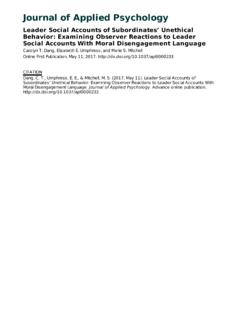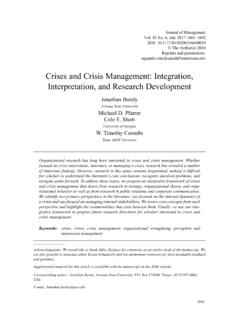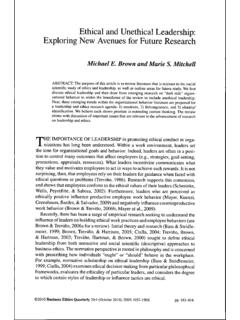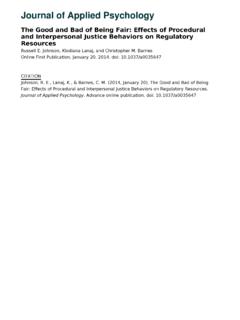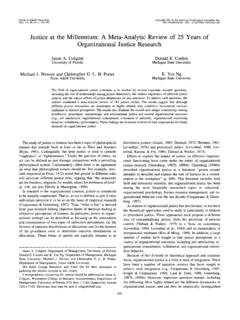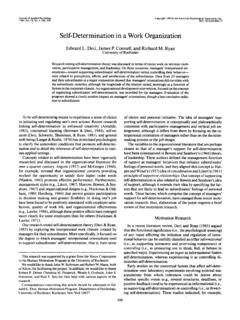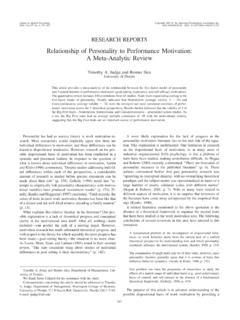Transcription of Journal of Applied Psychology - University of Georgia
1 Journal of Applied PsychologyThird Parties Reactions to the Abusive Supervision ofCoworkersMarie S. Mitchell, Ryan M. Vogel, and Robert FolgerOnline First Publication, September 22, 2014. , M. S., Vogel, R. M., & Folger, R. (2014, September 22). Third Parties Reactions tothe Abusive Supervision of Coworkers. Journal of Applied Psychology . Advance onlinepublication. Parties Reactions to the Abusive Supervision of CoworkersMarie S. MitchellUniversity of GeorgiaRyan M. VogelPennsylvania State University ErieRobert FolgerUniversity of Central FloridaThis research examines 3rd parties reactions to the abusive supervision of a coworker.
2 Reactions weretheorized to depend on 3rd parties beliefs about the targeted coworker and, specifically, whether thetarget of abuse was considered deserving of mistreatment. We predicted that 3rd parties would experienceanger when targets of abuse were considered undeserving of mistreatment; angered 3rd parties wouldthen be motivated to harm the abusive supervisor and support the targeted coworker. Conversely, wepredicted that 3rd parties would experience contentment when targets of abuse were considered deservingof mistreatment; contented 3rd parties would then be motivated to exclude the targeted , we predicted that 3rd parties moral identity would moderate the effects of 3rd parties experienced emotions on their behavioral reactions, such that a strong moral identity would strengthenethical behavior ( , coworker support) and weaken harmful behavior ( , supervisor-directed deviance,coworker exclusion).
3 Moderated mediation results supported the predictions. Implications for theory andpractice are :abusive supervision, exclusion beliefs, supervisor-directed deviance, coworker support,coworker exclusionMany of us have been exposed to organizational authoritiesacting cruelly or abusively toward employees. Both the popularpress (Pachter, 2003; Sutton, 2010) and academic studies (Cortina,Magley, Williams, & Langhout, 2001; Neuman & Keashly, 2003)have shown that employees are often victim to egregious anddemeaning acts by supervisors, termedabusive supervision(sub-ordinates perceptions of sustained hostility against them by asupervisor; Tepper, 2000).
4 Given its prevalence, researchers havesought to understand the consequences of abusive supervision andfound it has a significant toll on its victims. For instance, abusivesupervision has been found to heighten victims psychologicaldistress, emotional exhaustion, self-regulation impairment, and jobburnout (see Martinko, Harvey, Brees, & Mackey, 2013, andTepper, 2007, for reviews). Recently, researchers ( , Harris,Harvey, Harris, & Cast, 2013; Priesemuth, 2013) have turned theirattention to understanding how abusive supervision affects thelarger work environment and, specifically, to third party employ-ees.
5 This research has shown that witnessing abuse can motivatedifferent third party behavioral reactions, such as counterproduc-tive behavior that is harmful to coworkers (Harris, Harvey, Harris,& Cast, 2013) and prosocial behavior intended to help the target ofabuse (Priesemuth, 2013). What is less clear, though, is why thirdparties react one way versus another and which factors influencetheir different applications of deontic justice theory (Folger, 1998,2001) suggest that witnessing abusive supervision would anger thirdparties. The experience of anger would then motivate these thirdparties to redress the transgression by harming the perpetrator, par-ticularly if these third parties held a weak moral identity (defined asthe degree to which moral principles are strongly aligned with one ssense of self; Aquino & Reed, 2002) because third parties with a weakmoral identity are less concerned about maintaining kind, caring, andfriendly behavior toward others (see Jennings, Mitchell, & Hannah, inpress, for a review).
6 An implicit assumption to the traditional appli-cation of deontic justice theory, however, is that all third partiesbecome angered by another s mistreatment because all third partiesbelieve mistreating others is present an alternative view and theorize that not all thirdparties believe it is unfair to mistreat specific coworkers. Ourarguments are consistent with research that has shown that em-ployees sometimes find coworkers to be provocative targets ofabuse (Kim & Glomb, 2010; Lam, Van der Vegt, Walter, &Huang, 2011). Moreover, recent work has shown that third parties perceptions of fairness can be biased (Blader, Wiesenfeld, Fortin,& Wheeler-Smith, 2013).
7 This research has shown that thirdparties reactions depend on their evaluation of the recipient of theMarie S. Mitchell, Department of Management, Terry College of Busi-ness, University of Georgia ; Ryan M. Vogel, Department of Management,The Behrend College, Pennsylvania State University Erie; Robert Folger,Department of Management, College of Business Administration, Univer-sity of Central would like to acknowledge the financial support provided by theTerry Sanford research grant from the Terry College of Business, Univer-sity of Georgia . We would also like to thank members of the BehavioralEthics Group for their valuable feedback during the 2012 workshop seriesin Orlando, concerning this article should be addressed to Marie , Department of Management, Terry College of Business, Univer-sity of Georgia , 404 Brooks Hall, Athens, GA 30602.
8 E-mail: document is copyrighted by the American Psychological Association or one of its allied article is intended solely for the personal use of the individual user and is not to be disseminated of Applied Psychology 2014 American Psychological Association2014, Vol. 99, No. 6, 0000021-9010/14/$ Third parties become angered by unfair outcomes givento recipients who they positively evaluate and become contentedby unfair outcomes given to recipients who they negatively eval-uate. Given these findings, we argue that it is possible for somethird parties not to experience anger as is implicit in traditionaldeontic justice reasoning but instead may experience contentmentfrom the abuse.
9 We theorize that the different emotions elicitedwill motivate different behavioral reactions from third work, therefore, extends deontic principles to consider thirdparties evaluation of the target of abuse. We develop and test amodel, which integrates principles from deontic justice theory(Folger, 2001, 2012) with scope of justice theory (Deutsch, 1974;Opotow, 1990, 1995), to explain differential third party reactionsto the abusive supervision of a coworker. Deontic justice theorysuggests that mistreating another ( , abusive supervision) moti-vates third parties to react according to what they believe is just and fair.
10 We draw from scope of justice theory to explain that thirdparties beliefs about what is just depend on their perceptions ofthe target of abuse. Specifically, we propose a critical factor thatinfluences third party reactions is their exclusion beliefs, definedas individuals beliefs about the degree to which another persondeserves disrespectful or unfair treatment (Opotow, 2012).We theorize that witnessing abusive supervision elicits dif-ferent emotions and that the type of emotion evoked depends onthird parties exclusion beliefs about the target of abuse. Thirdparties with lower exclusion beliefs perceive the target asundeserving of mistreatment, and, thus, these third partiesshould experience anger a sense of hostility about the victim sabuse.
